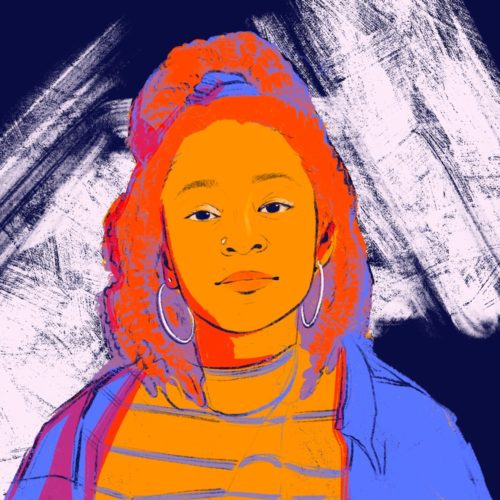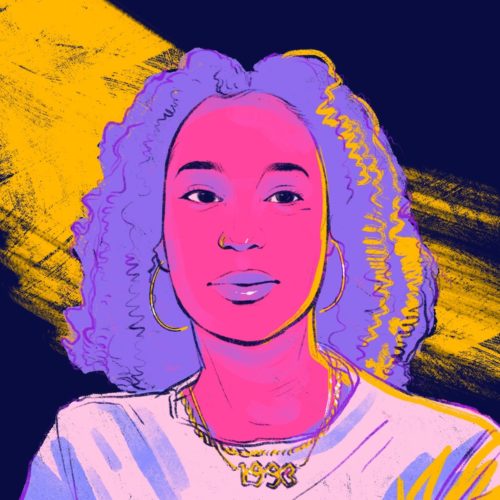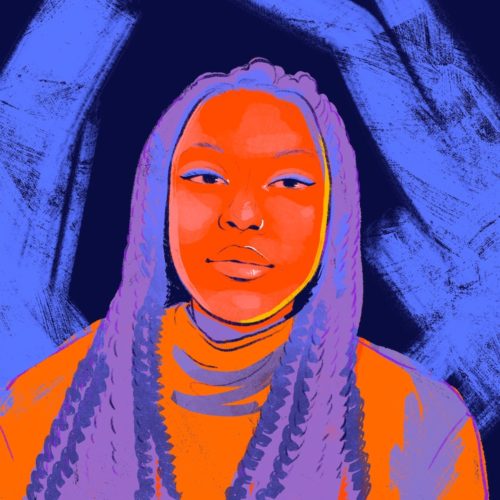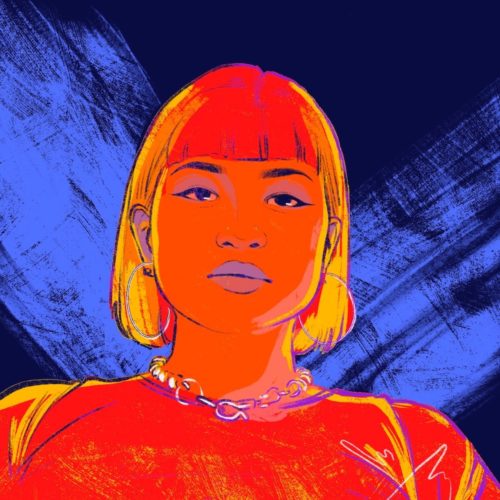If the term “female rapper” is commonly used to describe women who create rap music, why aren’t men who rap referred to as “male rappers?” The distinction suggests that rap, or hip-hop music in general, was created for and by men. There’s no doubt that men who make rap or hip-hop adjacent music are the most celebrated faces of these genres. But women have always been an integral part of hip-hop culture and music.
DJ Kool Herc is commonly considered one of the founding fathers of hip-hop, having created the record-mixing, beat-break style of DJing. However, Herc and his techniques may not have reached such popularity had it not been for his sister, Cindy Campbell. On August 11, 1973, Campbell threw a back-to-school party to raise money for new clothes with the main attraction being her then sixteen-year-old brother spinning all night. The party was a huge success, and Herc was catapulted to popularity all over the Bronx.
Campbell and her brother continued to throw parties and outdoor events as Herc became more and more famous. Masters of Ceremonies, or MC’s, would shout out names or quick rhymes to entertain the crowds. The sounds of their voices married between beat-breaks and loops were the genesis of rap music.
Women were among the first rappers too. Not long after the birth of hip-hop, The Mercedes Ladies were founded, a group of women by the names of Sheri Sher, DJ RD Smiley, Tracy T, Eve-a-Def, Zena-Z, DJ La Spank, and DJ Baby D.
“Forget what ya heard about rap being a man’s world,” Sheri Sher states in her book, Mercedes Ladies (2008). “Women have been a part of hip-hop from the very beginning. And before all the others was us, The Mercedes Ladies, the first all-female DJ and MC crew.”
In her book, Sher details the trials, tribulations, and triumphs the group faced, including the struggle for respect from their peers. “The promoters would pay the L Brothers and Grandmaster flash, but when it was time to pay the Mercedes Ladies, we didn’t get paid.”
In the summer of 1979, Sylvia Robinson heard the underground sounds of hip-hop music at a club in Manhattan and grabbed hold of the genre, inviting it to the mainstream music industry. Earlier that year, Robinson and her husband founded the Sugar Hill Records label and were in search of artists to pioneer.
With the help of her son, producer Robison and Sugar Hill Records championed the label’s first song, “Rappers Delight” featuring Michael “Wonder Mike” Wright, Henry “Big Bank Hank” Jackson, and Guy “Master Gee” O’Brien, who became The Sugarhill Gang. “Rappers Delight” became the first rap song to sell over a million copies and the first rap single listed on the Top Forty of Billboard’s Hot 100.
Hip-hop and rap music were taking their first steps during such a fruitful time for many genres spearheaded by Black, Latinx and Caribbean folks in New York. Meanwhile, DJ’s Larry Levan and Frankie Knuckles, childhood friends, were two prodigies taking over the Gallery, a disco club in Manhattan, in the late 1970’s.
When a group of promoters from Chicago recruited Knuckles to DJ at a new nightclub opening in West Loop called the Warehouse, it was a turning point in Chicago music history. House music, forged from funk, disco and hip-hop subculture with a largely gay, Black and Latinx crowd, spread across the City and beyond. While the earliest rappers and hip-hop artists were not from Chicago, the urban music scene in the City made itself known very quickly.
With house music fused with hip-hop as a stepping stone, many artists emerged as Chicago’s first well known rappers. Among these talents was Da Brat, who grew up on the West and South Sides of the city. Funkdafied, her debut album, made her the first female rapper to achieve platinum status on a project, selling over one million copies. In 1997, Da Brat was featured on Missy Elliot’s debut album, Supa Dupa Fly, which also went platinum and was subsequently nominated for a Grammy. Missy Elliot, another prominent woman in rap music and music in general, became the first female rapper to be nominated for the Songwriters Hall of Fame in 2018.
Missy Elliot’s rise to fame in the 90’s ran parallel to several other great women. MC Lyte became the first Grammy nominated woman in rap in 1994, and then the next year Queen Latifah and Salt-N-Pepa took home the first Grammy win for female rappers.
But the historical feats of these artists are not limited to “firsts” as women. In 1999, Lauryn Hill became the first rap artist, regardless of gender, to ever win Album of The Year at the Grammys. Hill is considered one of the most influential rappers of all time; seated on the list of Most Grammys Won by rappers she ranks sixth with eight Grammys in total.
It’s clear that women have been at every historical turning point in hip-hop, rap, and all adjacent genres as they journeyed to the mainstream, yet many artists still find themselves counted out and outnumbered by men. Still, that hasn’t stopped women from continuing to make their mark in the music industry.
Among the endless list of talented women in Chicago are Jasmine Barber, Brittney Carter, Senite, and King Marie. The Weekly sat down with these artists who are navigating this ever-evolving music scene to talk about their journeys, wins, and grievances, and how their identities shape their worlds and how the world sees them.
Meet Brittney Carter, Jasmine Barber, Senite, and King Marie
“I think one of the things that gets under my skin though, being a woman and doing what I do, it’s probably the lack of people not understanding that I’m a layered human,” said Brittney Carter. Brittney is a rapper from the South Side who entered the city’s music scene in 2015 when she started frequenting workshops and open mics. She started creating music more seriously around 2018.

Among her inspirations are 2Pac, Nas, Brandy, Jay-Z, Kendrick Lamar, J.Cole, Lil Wayne, and, of course, Ms. Lauryn Hill. “Oh, man, she was like the standard,” Brittney said.
“I remember when I was going to the open mics, I wasn’t going to perform. I was honestly going to listen,” Brittney recalled. She remembers meeting a lot of women who were artists at various open mics, even if they didn’t perform. “I didn’t see too many women performing there.”
“I’ve definitely felt like it’s way easier for men to support men than it is for men to support women,” said Senite, who makes neo-soul, R&B, lo-fi, and alternative hip-hop music. Although she’s from the North Side, where she started and cultivated her talents, she’s found community in the South Side in recent years as well.
Earlier this month, Senite curated “All About Love,” an event centered around women and marginalized gender identities which took place at the new FOURTUNEHOUSE Art Center in Bronzeville. The idea for the event stemmed from the overturning of Roe v. Wade and the realization that there is a lack of spaces where women and non-men could connect with each other and express themselves in a comfortable environment.
Both Brittney and Senite have found themselves wondering or searching for ways to connect with more women who make music, which they coincidentally had a conversation about recently, prior to knowing they were both a part of this story for the Weekly.
“I had a conversation with Brittney Carter,” Senite began, “I was telling her that there’s not a lot of women that I know in this shit and it really sucks.”
“I don’t know too many women in the scene who rap in Chicago. I have no idea,” Brittney said. “I know they’re out here. But as far as like, having a relationship with or like where they are? I have no idea.”
She feels that the disconnect stems from some artists not being given the platform they deserve. “As a female artist, it’s really difficult to have a full non-male band—I couldn’t even tell you a long list of people that are not men that are able to be in a band with me, or in general,” Senite said. “I’m purposely making connections that are not men because of it, but it shouldn’t be like that. I shouldn’t be trying my hardest to find who’s in this bitch.”
A common space for musicians to gather and commune are recording studios. Artists may invite friends or other musical peers to sit in on their studio sessions as they lay down tracks and create songs. “Usually when I pop out to sessions, it’s mainly to honestly just kick it sometimes. I’m there to learn something, and watching other artists in the studio is very interesting,” Brittney said.

The studio environment can be fun and inspiring for most, but women can easily face obstacles or feelings of discomfort being outnumbered in these spaces. “I was actually recording at the studio. And for some reason, there were a lot of different men just invited to the studio. I don’t know really what they were there for. But it made me uncomfortable. Like, they weren’t recording, they weren’t doing anything. They were just there smoking,” Brittney said.
While she normally has a good experience at the studio, citing that her favorite sessions are those where R&B artists are present, sometimes she just wants to lay her track down and leave.
Senite’s sentiments for male dominated studio spaces and shows have at times caused concerns surrounding her safety. If she’s invited to perform at a show and notices she’s one of few, if not the only, woman on the bill alongside men she’s unfamiliar with, it makes her anxious. “I’ll be the only woman in this greenroom and, on some real shit, I’m like terrified,” she said, “I definitely learned I don’t always have to say yes.”

“I’m always scared at the back of my mind. Like if somebody wanted to, in this soundproof studio they could do whatever they wanted to me and I have no way to defend myself,” Senite said as she describes how she thinks of what she knows is the worst case scenario, but still possible. “If I don’t trust you and I feel like you’ve proven to me that you’re not someone I can trust or be comfortable around, there is no room for me to see if that’s true or not.”
On the other hand, she has also made close friends with guys that she’s met in artist spaces as well whom she refers to as her “brothers.”
“I feel definitely supported by, you know, a portion of people in this shit with me. And I found those people so I feel really great and solid in that I’m comfortable. But it’s definitely not an easy thing to navigate,” she said.
Jasmine Barber, also known as J Bambii, makes it a point to practice gratitude for the good in tandem with recognizing the bad. “I feel like I’ve gotten a lot of support as a music artist. I’ve had a lot of support, especially in other places. Also, my support has been very…my supporters are really honest—I feel like real niggas listen to my music,” Jasmine said.
Having grown up on the South Side, her parents and siblings all had some type of creative inclination, whether it was a love for music or the creation of art. When she was a freshman in high school, one of her teachers introduced her to a poem on Def Jam Poetry, a series that centered the Black experiences and urban culture as artists expressed themselves through spoken word.
“I just remember being like, ‘I’m so moved. This nigga makes me want to write about my feelings, too, my sadness, my anger,’ you know? And I didn’t know you could do it like this. I didn’t know you could yell. I didn’t know you could talk like this,” she said.

Poetry was also an integral building block for King Marie, a musical artist, singer, songwriter, rapper, and DJ. Similarly to Jasmine, she comes from a creative and musical family; her mother is a singer, and both of her brothers are DJs.
“Writing and then putting melody to the poems, that was like my early stage of songwriting,” King Marie said. “Singing, songwriting, has always been me; I wanted to be just like my mom, and I’m like, oh, you know, the boys in my family, they DJ, that’s cool,” she said, expressing that she wasn’t initially the most interested in DJing.
Jasmine has learned to divorce measuring her craft with the same merit-based metric that school systems use to grade assignments. “Just because Cardi B is charting the Top 100 does not mean she’s a better rapper than me. Just because a nigga sold out a show, does not mean that the show you threw that didn’t sell out or only sold half the tickets was not a good show,” she said.
“If I could go back and tell my younger self anything, I would definitely be like, ’I belong here,’” Brittney said as she recalled feelings of insecurity that stemmed from comparisons in her creative journey as well. “I think for a long time I just felt like because I hadn’t went through all of the stuff that everybody else went through, that it somehow invalidated what I was doing. I was definitely really hard on myself and really critical in the beginning.”
“Just go where the love is until the people that didn’t support see it happening,” King Marie advised her younger self, “because a lot of the times people don’t support because they don’t understand and they don’t know how.”
“I think that a lot of times people just need perspective,” Jasmine said. However, she also acknowledges that she’s not immune to feeling disturbed by the way inequalities fueled by gender and race put the work of others on a pedestal.
“I’ve been fucking enraged by not having no support and watching niggas support weak ass shit, or support nonblack people doing the same exact thing, or supporting men who are weak as fuck, and I got homegirls, including myself, that are rapping circles around these niggas.”
“When I first started DJing there was really only two big women DJs in Chicago, and they were both white,” said King Marie, whose connection to music is influenced by her own Filipina culture and roots. Still, she relinquishes no power to the idea of a “male-dominated industry,” stating that “it only exists if we allow it to be that.”
Cognizant of clubs and promoters who still fail to hire anything but male DJs, and grateful for her brothers and mentor who were also men, her focus is on how beautifully diverse their communities have become. “I love the fact that it was like, okay, well, there’s no space for us, we’re gonna do it ourselves.”
After moving to New York when she graduated college, she discovered how much work achieving her dreams would take. “’Damn, I should have started DJing,’” she recalled telling herself, “that’s the guaranteed ’I’m gonna get a bag at the end of the night.’”
King Marie learned the basics of DJing from her brothers initially, but when she started taking the craft more seriously she realized that it was a way for her to still feel connected to music as well as her journey took twists and turns. While many people might only speak of their wins, she covets the lessons she’s learned along the way. “I feel like the hardest parts of the journey need to be glorified as well, because it wasn’t overnight,” she said.
For Senite, some of these lessons include discerning what opportunities are beneficial, and which ones to decline. Having grown up in an immigrant household as well, she innately has a mindset that assumes “every opportunity that comes my way is like a God-given one,” she said. “I learned that sometimes being in those [unsafe] spaces is like a lesson learned on navigating; how to move, how to act, who to be with, who to be around, how to feel safe. It sucks to say that I was in spaces where I was terrified, but I know now how I could possibly give guidance to other people that have a possibility or likelihood to be in that same space at some point.”
Featured in her upcoming show, King Marie boasts a lineup featuring only women and nonbinary artists. “It’s time, you know what I mean? Like we’ve been in the shadows long enough,” she said. “There are supportive men also, so I don’t want to discredit and group them all [together], but it’s been a really beautiful thing.”
Although she’s found community with women who DJ, work in fashion, and create visual art, it’s less frequent that she meets musicians and rappers that are women as well. “I would love to collaborate with more women when it comes to creating music. I just don’t think I’ve ever found a full space to where it’s only been women.”
“I started doing shit for me and the people who actually want to be there,” Jasmine said. “Sometimes we just gotta stop putting value in who or what is or is not listening to our music and really value who is.”
“Men support me a lot, girls do too, but there’s a lot of men that hold space. And I just think that what’s part of being a Black woman rapper is, you gotta make these niggas support you!” she said. “You gotta be willing to say the things that might get you put out, that might get you banned, that might get you censored.”
“Now that we’re full circle, now I’m DJing and breaking my own records, because I can do that, you know what I mean?” King Marie said as her hard work has begun to pay off, “Or I’m singing and performing behind the DJ booth because I could do that. So it’s like, I’m doing all of the things that I love. And now it’s not one or the other.”
Jasmine also spoke about the importance of focusing on those who connect with her music in a metaphysical way, regardless of relatability to the content. She feels that a good audience can vibe with music even if they don’t completely understand the experiences in the message being shared. “I have a song called The Undesirables, and it’s about being bigger and dark skin, and how that truly kept me, “supposedly”—in quotes—kept me, from things, you know? I feel like my music career has been based on raw real talent and character.”
All of the women relate so much of their growth to regaining sight of, and staying true to, themselves despite the expectations of their surroundings. “To be able to share what I love to do with the people that I love has been a full life, you know, and I’m very grateful,” said King Marie. “God made music and music saved me, and we’re here.”
“There’s definitely been a number of people that had been trying to tell me what to wear, telling me what to post, telling me what music to make, telling me how to act, telling me how to talk,” Senite recalled, “and I almost never said ’no’ out of fear.”
“I feel like I’m just more confident in my ability and what I’m doing so it’s like, I don’t have to do anything I don’t want to do,” Brittney said, laughing.
“I think it’s important that niggas know that my music is me,” Jasmine said as she concluded. “Stop making music to prove somebody wrong or prove something to somebody else. Make music for you.”
Chima Ikoro is the community organizing editor for the Weekly. She last wrote about Kina Collins running for Congress in Illinois’ 7th Congressional District.



